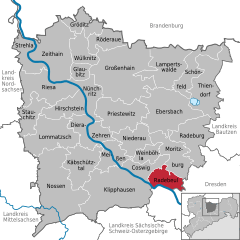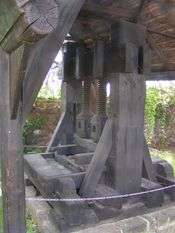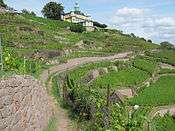Radebeul
| Radebeul | ||
|---|---|---|
|
Spitzhaus above the vineyards of Radebeul | ||
| ||
 Radebeul | ||
Location of Radebeul within Meißen district 
 | ||
| Coordinates: 51°06′N 13°39′E / 51.100°N 13.650°ECoordinates: 51°06′N 13°39′E / 51.100°N 13.650°E | ||
| Country | Germany | |
| State | Saxony | |
| District | Meißen | |
| Government | ||
| • Mayor | Bert Wendsche | |
| Area | ||
| • Total | 26.06 km2 (10.06 sq mi) | |
| Population (2014-12-31)[1] | ||
| • Total | 33,853 | |
| • Density | 1,300/km2 (3,400/sq mi) | |
| Time zone | CET/CEST (UTC+1/+2) | |
| Postal codes | 01435-01445 | |
| Dialling codes | 0351 | |
| Vehicle registration | MEI | |
| Website | www.radebeul.de | |
Radebeul is a town (große Kreisstadt) in the Elbe valley in the district of Meißen in Saxony, Germany, a suburb of Dresden. It is well known for its viticulture, a museum dedicated to writer Karl May and a narrow gauge railway connecting Radebeul with the castle of Moritzburg and the town of Radeburg. The Meißen area, where Radebeul is located, is one of the northeasternmost areas where wine is grown today.
It is sometimes called "Saxon Nice" for its pleasant landscape and mild climate.
History
A village Radebeul was first mentioned in 1349. In 1905 it absorbed the neighboring village of Serkowitz. On April 1, 1924 Radebeul became a town. Meanwhile, the neighboring village of Kötzschenbroda had taken over Lindenau in 1920 and Naundorf, Zitzschewig und Niederlößnitz by 1924, when it was made a town as well. In 1934 Wahnsdorf and Oberlößnitz joined Radebeul, and on January 1, 1935 the towns of Kötzschenbroda and Radebeul were united under the name of Radebeul ("Kötzschenbroda" having a Slavic root, this name was considered too "ungermanic" at the time). In 1947 Radebeul was made part of the district of Dresden. In 1995 it received the status of a major town inside the rural district (große Kreisstadt); when the rural district of Dresden (Dresden-Land) was dissolved, Radebeul became part of the district of Meißen.
Transportation
The town can be reached by Dresdner Verkehrsbetriebe tram route 4 or by Dresden S-Bahn line S1, which serves four stations in Radebeul (Radebeul Ost, Radebeul-Weintraube, Radebeul Kötzschenbroda and Radebeul-Zitzschewig) on the Pirna–Coswig railway. Deutsche Bahn's Regional-Express 50 service also stops at Radebeul Ost. It is also the terminus of the historic Radebeul–Radeburg narrow-gauge steam railway and the station closest to the Karl May Museum.
Controversy over Native American scalps at Karl May Museum
Despite the fact that Native American remains are sacred items, the Karl May Museum keeps and displays several actual Native American scalps. One of the scalps was obtained in the U.S. in 1904 by Karl May's friend, Patty Frank, who bought the scalp from Dakota Chief Swift Hawk for two bottles of whiskey, a bottle of apricot brandy and $100. Swift Hawk had cut the scalp from a member of the Ojibwe (Chippewa) Tribe.[2] Cecil Pavlat, an official with the Sault Ste. Marie Tribe of Chippewa Indians in Michigan, called the museum's act of displaying the scalps "inappropriate and unacceptable," and said, "These are human remains which should be buried respectfully and should never have been taken from the tribe in the first place." Members of the Chippewa Tribe say they are considering staging a protest at the annual Karl May Festival in Radebeul in May 2014.[3]
Public Services and Health Care
The volunteer fire department of Radebeul looks back on a long tradition, being founded in 1897 and thus making it the oldest department of the city.
Today the volunteer fire department of Radebeul consists of four separate quarter departments: Radebeul-Ost, Kötzschenbroda (Naundorf), Lindenau and Wahnsdord. Each of the departments has his own junior firefighter section. The quarter department of Radebeul-Kötzschenbroda was founded 2008 in the course of the construction of a rescue central station in Radebeul West. In the process the volunteer fire departments of Radebeul-West and Naundorf where consolidated. The rescue central station also houses the "Technisches Hilfswerk Radebeul"
In 2011 the departments counted 136 members in total, 99 on active duty and 37 members in the elderly and honor department. The junior firefighter section had overall a number of 64 young members.
In 2012 the department got his long desired flag of honor. The assets cost (including gear) totaled a sum of around 12000 Euro, which were gathered through donations (citizen and companys alike). Every donator had the possibility to signature one of the flag nails with his name. The donation period lasted from March to the end of July 2012, enabling the makings of the flag in September. The flag consecration took place at the 08.11.2012. The departments of Meißen, Moritzburg and Coswig were invited to this ceremony. The flag consecration sponsorship was picked up by the county fire fighter organization of Meißen. As the patron stepped in the president of the parliament of Saxony, Dr. Rößler. The flag currently is stored at the city hall in Radebeul.[4]
Main sights


Radebeul has been renowned for its vineyards since 1324. It lies on the Saxon Wine Road.
Theatre
- Landesbühnen Sachsen
Museums
- Karl May Museum
- Stadtgalerie Radebeul
- Hoflössnitz Stiftung Weingutmuseum
- Volkssternwarte „Adolph Diesterweg“
- "Zeitreise" Interessantes zur DDR-Zeit
Edifices
- Karl-May-Museum (Villa Shatterhand and Villa Bärenfett)
- Grave of Karl May
- the Bilzbad (named after Friedrich Eduard Bilz 1842-1922)
- the Sorgenfrei House, a Weingut, built 1785/1788 in the so-called Dresdner Zopfstil (between Rokoko and Classicism)
- the Lößnitzdackel, a narrow gauge railway from Radebeul-Ost via Moritzburg to Radeburg
- the distinctive Watertower
- Friedensburg
- Bismarckturm
- Spitzhaus
- Spitzhaustreppen
- the Krapenburg
Regular events
- the annual Karl-May-Fest on Ascension weekend
- the annual Radebeuler Grafikmarkt which takes place each autumn - patronised by many well-known artists
- the annual Spitzhaustreppenlauf - a race up 397 steps of the Spitzhaus
- the annual Mt. Everest double-marathon - this involves going up and down the steps 100 times - a total of 39,700 steps: twice the standard marathon-distance, and the height of Mount Everest (can be entered by individuals, or teams of 3 or 100)
Famous People
- Lothar Schmid (1928 - 2013), Chess Grandmaster
International relations
Radebeul is twinned with:
 Sierra Vista, Arizona, USA
Sierra Vista, Arizona, USA Cananea, Sonora, México
Cananea, Sonora, México Obukhiv, Ukraine
Obukhiv, Ukraine St. Ingbert, Germany
St. Ingbert, Germany
References
- ↑ "Aktuelle Einwohnerzahlen nach Gemeinden 2014] (Einwohnerzahlen auf Grundlage des Zensus 2011)" (PDF). Statistisches Landesamt des Freistaates Sachsen (in German). 7 September 2015.
- ↑ "Zur Geschichte des Karl-May-Museums, seiner indianischen Sammlungsobjekte und deren Präsentation" http://www.karl-may-stiftung.de/museum/indianer/hoffmann.html
- ↑ "German museum in row with US activists over tribal scalps http://www.theguardian.com/world/2014/mar/10/german-museum-karl-may-native-american-scalps"
- ↑ feuerwehronline
External links
| Wikimedia Commons has media related to Radebeul. |
 Radebeul travel guide from Wikivoyage
Radebeul travel guide from Wikivoyage
| ||||||||
|
